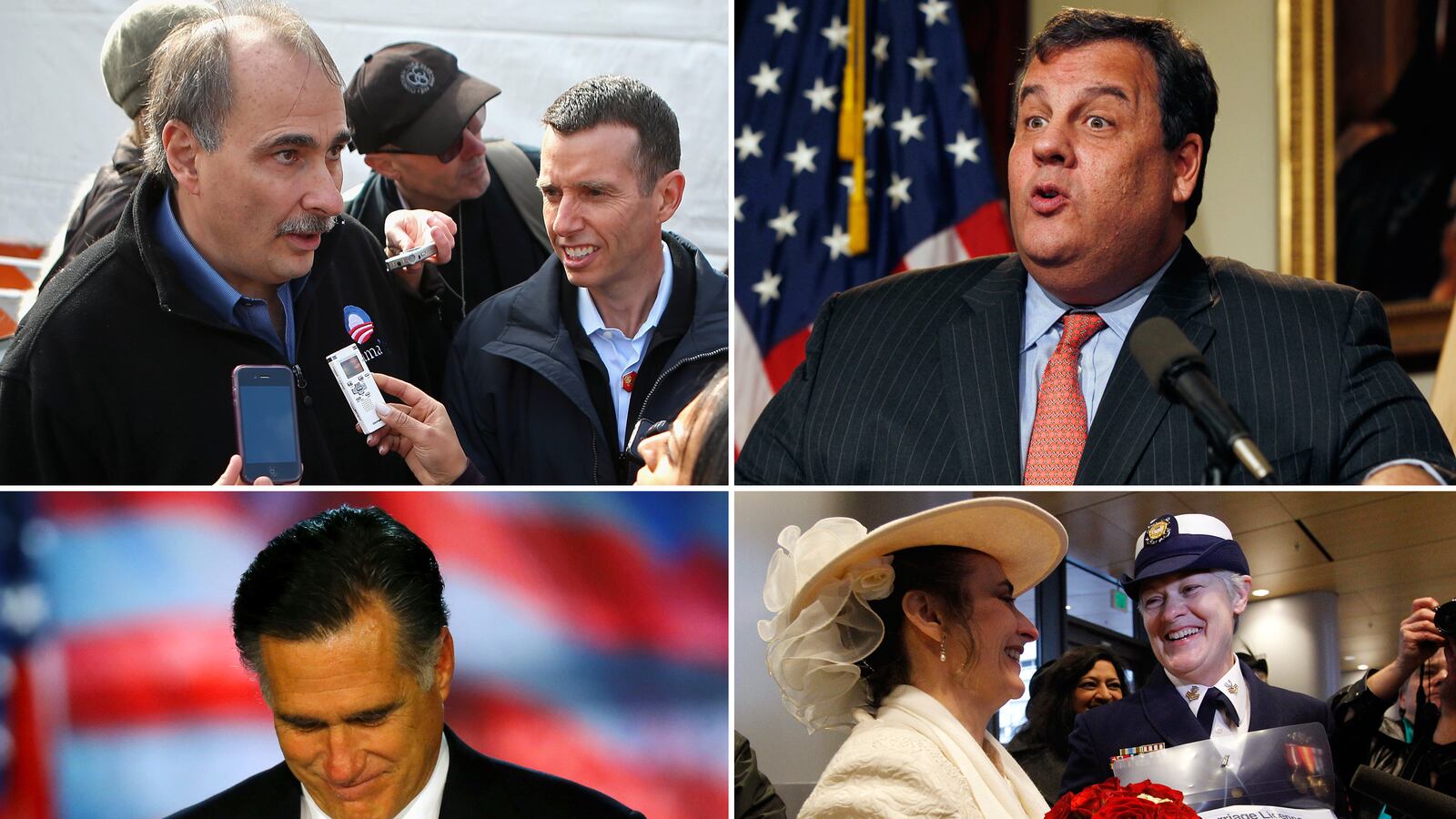Before 2012 fades into the recesses of history—and the recriminations and recurring nightmares of Republicans so recently infused with the conviction that the nation detested Barack Obama as much as they did—an accounting is in order. Beyond Obama in the White House, who were the biggest winners in the 2012 presidential race? And because attention must be paid, but brief attention is the fate of the defeated, who beyond Romney in La Jolla were the biggest losers? I start with the winners.

1. The Obama Campaign Team. Strategists David Axelrod, David Plouffe, and the quiet but indispensable Mike Donilon; campaign manager Jim Messina; deputy campaign manager Stephanie Cutter; media-maker Jim Margolis; pollster Joel Benenson, who got the race exactly right; and the cyber gurus who revolutionized the electoral landscape. In politics, genius is often luck. And timing facilitated some of the campaign’s singular success—for example, the hyper-change in the internet and social media. But the Obama team harnessed the future and exploited it brilliantly. If their high-tech voter contact operation were a stock like Apple, it would be trading at $1,000 a share.
This was the best campaign in modern presidential history, with consistent communications in ads, speeches, and the back and forth on the tube. Cutter became a media star and dispatched the utterly unfair blame leveled at her during the 2004 Kerry effort. The Obama message discipline was awesome. Its operatives defied critics in their own party—for example, Newark Mayor Corey Booker and former Pennsylvania Governor Ed Rendell when they criticized the Bain ads that would devastate Romney as class warfare. The ads kept running—and the Obama forces never let the contest be fought on Romney’s preferred field as a simple-minded referendum: If you’re a little unhappy about the economy, why not try the other guy? Instead they posed and prosecuted the election as a choice: Who’s on your side?
That leads to our next big winner.
2. The Populist Appeal. This is the ground of the Democratic Party’s being—or as FDR expressed it, the conviction that “sound economic improvement comes from the improved conditions of the whole population and not a small fraction.” This was not just expressed in the Bain attacks—which were providentially reinforced by Romney’s “47 percent” comment animadversion—the gaffe of all gaffes, which left him twisting slowly, slowly in the political wind. The campaign focused relentlessly on tax fairness, demanding that the wealthy pay their fair share. There was a robust embrace of Obamacare and Wall Street reform. The once reviled auto bailouts became the president’s linchpin in Ohio. And whether in that role or after Hurricane Sandy, government itself was seen and spoken of as an affirmative instrument of high purpose and economic progress.
Gone was the timid triangulation that danced around and away from the liberal ideal. If Hillary Clinton seeks the White House in 2016, she will run as the legacy of an Obama-renewed progressivism, not as a successor to the maneuver end trimming of the 1990s. For years into the future, the Democratic Party will carry forward the mission described by Ted Kennedy at the 1980 convention—“to speak for those who have no voice, to remember those who are forgotten, to respond to the frustrations and fulfill the aspirations of all Americans seeking a better life in a better land.” As the president prevails one way or another on the fiscal cliff, as health reform takes hold and gathers more and more popular support, as the economy revives, “the great purposes of the Democratic Party,” in Kennedy’s words, will be the continuing, central, and animating force for Democratic candidates and presidents; they will not “become bygone passages of history.”
That is the great achievement of Barack Obama in a grueling election year. Yes, he’s a big winner. But even more so are the party and the principles he renewed.
3. Equality for minorities and the majority who are women. Hispanics and immigration reform won big. Comprehensive reform will be the first major bill the president sends to Congress. Their backs against the electoral wall, Republicans are grappling awkwardly with the issue. GOP leaders know “their primary voters…hate anything that smacks of amnesty.” So much for Ronald Reagan, who passed it in the 1980s in a deal with Ted Kennedy. Their fallback is a series of small-bore bills like more visas for high-tech workers. It’s a head-spinning way to address the 12 million immigrants Mitt Romney wanted to “self-deport.” Grassroots Republican resistance to real progress here is fierce. The president and Democrats will own this cause—and this constituency. Comprehensive reform ultimately will pass and token measures won’t save the GOP from alienating Hispanics and all but annihilating their own chances to return to the White House.
Something similar is happening with gay Americans. The president endorsed marriage equality—a move that once would have spelled political doom, and an issue that may have cost John Kerry the presidency in 2004. Voters in Maine, Maryland, and Washington legalized same-sex marriage; in Minnesota, they rejected a constitutional amendment to define marriage as solely between a woman and a man. According to the Pew Poll, 49 percent of Americans now favor marriage equality, with only 40 percent on the other side—a 10-point gain in support in four years and 12-point fall in opposition. No other civil-rights march has moved so far so fast. The Supreme Court is now considering the question—and I am not as hopeful as some that the decisions will break 5 to 4 for equality—but the ultimate outcome is inevitable. As the conservative columnist George Will perceptively and pungently observed: “Quite literally, the opposition to gay marriage is dying. It’s old people.” And young people—who overwhelmingly disdain prejudice against LGBT Americans—overwhelmingly cast their ballots for Obama. They identify as Democrats—and that spells long term trouble for the GOP. The young are generally repelled by GOP intolerance and intransigence on social issues.
Women and reproductive rights were winners—in part because Romney echoed the far right and the Tea Baggers and the GOP-nominated Senate candidates who talked of “legitimate rape” and pregnancy as a result of rape as “something God intended.” They lost—and support for a woman’s right to choose was strengthened in critical states that determined the presidency—to 56 percent in Ohio, 63 percent in Virginia, and 71 percent in New Hampshire. The Supreme Court won’t be packed with justices intent on overturning Roe v. Wade. Equal pay for women, which Romney couldn’t bring himself to endorse, or didn’t dare to, will be enforced. No wonder the gender gap in 2012 was the largest since Gallup began tracking the metric in 1952.
And the cornerstone of equality, racial justice, prevailed against the tired and time-dishonored appeals to division and fear. Romney’s race-baiting ad alleging that Obama was eliminating the work requirement for welfare—a cheap and fraudulent caricature of an African-American president—failed with voters in battleground states. So did Romney co-chair John Sununu’s smear of Colin Powell, a smear as unworthy as it was unwise—that he was endorsing Obama as “somebody of [his] own race.”
Richard Nixon’s Southern strategy is dying—and confining the GOP to a regional cul-de-sac of massive resistance to the new America of diversity and tolerance. It’s worth noting that the solid South has never been a solid blessing: From the Civil War to FDR, Democrats who dominated the region only elected two presidents—and in four elections out of 19 never captured a majority of the popular vote. It’s happening again; a GOP which for decades has pandered to an old South aggrieved by civil rights has lost the popular vote in five of the last six presidential elections. And unless they improbably settle their own civil war in favor of what Dwight Eisenhower called “modern Republicanism,” a narrow, reactionary party of resentment will keep on losing—and the new and emerging America will be as big a winner again and again as it was in 2012.
4. Nate Silver of The New York Times. Not as consequential a winner, but a happy victory and vindication nonetheless. He aggregates public polls with a disciplined modeling system and called every state right before the presidential election. He was reviled on the self-deluded right—where a Luddite named Dean Chambers “unskewed” polls by arbitrarily changing the mix of Democrats and Republicans. Chambers, who after the outcome, denounced it a result of voter fraud, was the far-out edge of a more broadly based criticism of Silver. Morning Joe Scarborough called him a “joke,” but post-election offered a “semi-apology” that more gracefully conceded: “Nate Silver’s early predictions were right.” So were his later ones; maybe Joe should do a reverse Axelrod and grow a mustache in recognition of Silver as a big 2012 winner.
5. New Jersey Governor Chris Christie. In an indelible moment just days before Election Day, he put politics aside after Hurricane Sandy and stood with the president he had been campaigning against as they worked together to help and heal New Jersey. It was the right thing to do—on the merits and politically, at least in the state. In a post-storm poll, 67 percent of the voters there said he “deserved” reelection; only 25 percent disagreed. Apparently vulnerable prior to Sandy, Christie suddenly led Cory Booker 53 to 35 percent in a gubernatorial poll. Booker, who’s a promising young star, should probably wait a year and run for the Senate in 2014. Christie will coast to reelection, which should set him up for a White House run.
But will it—or is he a 2012 winner as well as a 2016 loser? Among Republican voters nationally, he’s in second place, at 14 percent, four points behind Florida’s neophyte Senator Marco Rubio. Surely Christie, who seems as authentic as Romney seemed phony, would have done better if he hadn’t committed the near-mortal sin of fellow-traveling with President Obama through the wreckage of the Jersey shore.
Finally, there are the unequivocal big losers. They are largely mirror images of the winners. Think of the clueless Romney message team and his hapless turnout team; the Wall Street wiseguy types dumb enough to invest in Rove’s super PACs; the almost beyond-satire, helmet-haired casino mogul Sheldon Adelson and the grasping Koch brothers; the Tea Partiers, the voter suppressors, the immigrant baiters and the gay-bashers; all the assorted purveyors of bigotry along with the zealots who railed against Planned Parenthood and a woman’s right to choose. And this includes not only the fundamentalist religious right, but the hardest-line Catholic bishops who apparently prefer cover-ups to Obamacare. In too many places, they turned their churches into the Republican Party at prayer.
The whole motley crew—and the Silver trashers and the Christie-blamers, are losers—not because their side got fewer electoral votes, but because they represent a lesser vision of a country of privilege, prejudice, a dogmatism imposed on others, and a politics of deceit that didn’t trick the voters , but fooled its authors into seeing their own ineluctable triumph. Instead the country voted for economic justice and equal rights.
On election night, as Rove squealed his dissent, the anchors on Fox News declared Obama had won. But the biggest winner of all was America.




